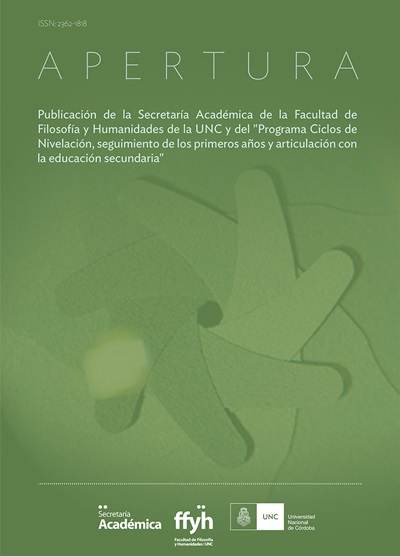The right to history and memory in the contemporary world
Main Article Content
Abstract
Once again, we are here to welcome the students of the different careers of the Faculty of Philosophy and Humanities of the National University of Córdoba. And we do so from a particular place: the panels on Human Rights, with more than a decade of history in our Faculty. On this occasion, I chose to share with you a classic but current topic: the right to history and memory in the contemporary world. Let's see what each of these words means; right, it refers us to conquest, to movements and struggles that preceded us. If we enjoy certain rights today, it will surely be because someone fought for them. When we speak of history we refer to a concept with many meanings: it names the discipline that studies historical events and processes and also its object of study. If we refer to the name that history received in classical Greece, it is closely linked to Mnemosine, the personification of memory. In our times, memory is linked to the readings of the past that we make from the present.
When we think of the right to history and memory in the contemporary world, we are thinking of a right situated in a certain time, that of you as entrants belonging to different generations who arrive at the University in 2019, after the UNC commemorated the hundred years of the University Reform of 1918. We will talk about the right to history and memory from this event.
The 1918 University Reform is the myth of the origins par excellence of the National University of Cordoba, conceived as a watershed between the university of academies, the elite and the university open to other social sectors. But in historical processes ruptures and continuities coexist; just as memory simplifies images in order to install a truth, to convince about the legitimacy of a certain reading of the past, present and future, history intervenes on historical time by questioning those images, remembering that historical processes are not linear, that certain realities do not disappear to give way to new times. Here I propose to make this exercise with this event that occurred in 1918; to go through some of the commemorations, forgetfulness and silences around it in different political scenarios of the 20th century: the first and third Peronist governments and the civic-military dictatorship of 1976
Article Details

This work is licensed under a Creative Commons Attribution-NonCommercial 4.0 International License.
Aquellos autores/as que tengan publicaciones con esta revista, aceptan los términos siguientes:- Los autores/as conservarán sus derechos de autor y garantizarán a la revista el derecho de primera publicación de su obra, el cuál estará simultáneamente sujeto a la Licencia de reconocimiento de Creative Commons que permite la generación de obras derivadas siempre que no se haga con fines comerciales. Tampoco se puede utilizar la obra original con fines comerciales.
- Los autores/as podrán adoptar otros acuerdos de licencia no exclusiva de distribución de la versión de la obra publicada (p. ej.: depositarla en un archivo telemático institucional o publicarla en un volumen monográfico) siempre que se indique la publicación inicial en esta revista.
- Se permite y recomienda a los autores/as difundir su obra a través de Internet (p. ej.: en archivos telemáticos institucionales o en su página web) después del proceso de publicación, lo cual puede producir intercambios interesantes y aumentar las citas de la obra publicada. (Véase El efecto del acceso abierto).

